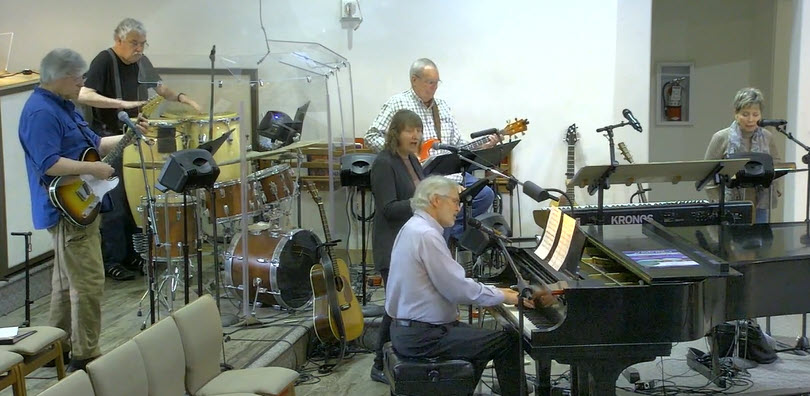
Jun 29, 2024 | Pastor Jim's Blog
Today’s Word from Pastor Jim…
Jesus said, “Do not judge, so that you may not be judged. For with the judgment you make you will be judged, and the measure you give will be the measure you get. Why do you see the speck in your neighbor’s eye, but do not notice the log in your own eye?”
Our middle daughter Kelsi is currently walking the pilgrim walk known as the Camino de Santiago in Spain. She is walking some 500 miles alone, on a spiritual journey of endurance and personal reflection. She is immersed in a foreign culture, joining pilgrims from every corner of the world as they follow in the 800-year-old footsteps of Saint Francis of Assisi. Kelsi texts me regularly to assure me of her safety and to share her musings. Midway through the journey she sent me a note reflecting on a cultural tradition that she experienced in the Roman Catholic Church of Spain saying, “Seems unnecessary, but what do I know?”
What a wise response from a visitor to a foreign land. How might our world be better if we were more aware of what we don’t know? Humility should be a mark of the Christian life; we do after all follow the one “who humbled himself.” The foot washing servant, the one who ate with known sinners, the blue-collar small-town Rabbi who died on the cross. Saint Augustine said, ”Humility is the foundation of all the other virtues.” The Philosopher Socrates said, “The only thing I know is that I know nothing.”
“What do I know?” Would it hurt our egos to admit what we don’t know? Or might we be freed from our judging and excluding by humbly owning the limitations of our knowledge. What do I know? Anytime we visit the Bible we are visitors to a foreign land and culture. We time travel back thousands of years, daily life would be unrecognizable to us. Anytime we visit the Bible we return to a prescientific era, where every drought was a judgement of God, every disability was attributed to sin, and mental illness was viewed as demon possession. What do I know? The 20th century Protestant theologian Karl Barth was asked what was the most important thing that he had learned after devoting his life to the academic study of theology. His response was, “I have learned Jesus loves me, this I know, for the Bible tells me so.”
Humility is a beautiful thing. What do I know? What do I know about the journey of a divorced mother trying to raise two children on her own? What do I know about the journey of parents who know that their child will never be able to live on their own? What do I know about the journey of those who have to wrestle with their gender identity? What do I know about the trials and tribulations of those struggling with addiction? What do I know about the foundational beliefs of other religious traditions? What do I know about what it feels to walk the streets as a black teenager in this country? What do I know about the Palestinian and Jewish people? What do I know about the lifelong consequences of being abused as a child? What do I know? Not much. “The only thing I know is that I know nothing.”
And what do I really know about God? I see in a mirror dimly. I know almost nothing of the one who is mostly hidden, the Master of the Universe, the Author and Creator of all life. What do I know? Jesus loves me. But Jesus also loves my neighbor, my neighbor of a different color, orientation, religion or party affiliation is equally loved by God.
Would it hurt us to admit what we don’t know? Can we keep it simple? Jesus said, “‘You shall love the Lord your God with all your heart and with all your soul and with all your mind.’ This is the greatest and first commandment. And a second is like it: ‘You shall love your neighbor as yourself.’ On these two commandments hang all the Law and the Prophets.” Matthew 22:37-40.
I know nothing, I am one beggar telling another beggar where to find bread, I am your,
Pastor Jim
If you would like to email Pastor Jim direct please send a note to: rvlindus@whidbey.com

Jun 22, 2024 | Pastor Jim's Blog
Today’s Word from Pastor Jim…
“Now there are a variety of gifts, but the same Spirit; and there are a variety of services, but the same Lord. To each is given a manifestation of the Spirit for the common good.” I Corinthians 12
It was the Fall of 1999. People were worried about Y2K. Bill Clinton was in the White House. Trinity Lutheran Church had a split campus, our offices and Sunday School space were all located on Highway 525. The gym, courtyard and Sunday School wing were not yet completed. Musicians came together to form a band, a worship band that would bring new music and a new sound to our services. Children of the 50’s mostly, rock and rollers who came of age in the 70’s, dreamed of making music together. Breaded Fish came together as a new century was dawning. Since January of 2000, for 24 years Breaded Fish in all its iterations has gifted the people of Trinity Lutheran Church with soft rock, guitar solos, and smooth harmonization. They shared their talents and proclaimed the Gospel with music.
For everything there is a season and a time for every matter under heaven. A time to be born and a time to die. A time to mourn and a time to dance. In a season of transitions, we will be saying goodbye to Breaded Fish. In a season of transitions, we will be saying thank you to Breaded Fish. We thank you for making our lives better, and our worship more beautiful. We thank you for sending us home on Sunday mornings with a song in our hearts and a bounce in our step. Blessed to be a Blessing—we have been Blessed by 24 years of music.
This Sunday we will be honoring Breaded Fish during worship and at a special coffee hour. I hope that you will be here to worship God, to thank the members of Breaded Fish and to remember Breaded Fish members who have moved on from our church or moved on from this world. In the past 24 years the members of Breaded Fish have included:
Brian Plebanek, Deb Lund, Karl Olsen, Ron Rossel, Sally Howard, Jim Nevermann, Steve Schrecengost, Brian Stelling, Matt Armstrong, Kathy Wilson, Kathy Stanley, Susan Blanton, Suzanne Buchannan, Carole Hofstad and Russell Hicks.
Please join me this Sunday! One beggar telling another beggar where to find bread, I am your,
Pastor Jim
If you would like to email Pastor Jim direct please send a note to: rvlindus@whidbey.com

Jun 15, 2024 | Pastor Jim's Blog
Today’s Word from Pastor Jim…
“Many of the Jews read this inscription because the place where Jesus was crucified was near the city, and it was written in Hebrew, in Latin, and in Greek.” John 19:20
I have studied four languages in my life: English, Spanish, Greek and Hebrew. Through it all, it has been painfully apparent that I have very little aptitude in this area of study. Truth be told, I have very little aptitude in any subject matter, though I did excel at recess and lunch in my school days. I can share my entire foreign language vocabulary quite easily: baklava, cerveza, boker tov, gracias, and bano rapido. Given my language challenges, I have always had great admiration for the multilinguists, standing in awe of all polyglots.
Recently, Felicia and I had the privilege of taking an Alaska cruise, 7 days roundtrip from Seattle. The ship was magnificent, the staff and crew were from every corner of the world, and they were accomplished polyglots. The guests on board were from a multitude of European countries, China, Japan, Canada, England, Norway and even Texas. It was a floating United Nations, and everyone was kind and considerate, unless you cut in the buffet line.
Now this could have been a little intimidating for a man who barely has a grasp of the American English language. I had no idea even what the Brits were saying. But I could not help but notice that there was a deeper, more primal form of communication that was shared by all and very easy to interpret. Our common humanity was on display, our evolutionary DNA did not distinguish skin color or nationality. All over the ship, at dinner, on shore and on excursions the smiles were all the same, laughter rang identical in every language, tender hugs were shared, children cried but their tears did not reveal their native lands or tongues.
We are human; our commonalities dwarf our culture differences. We are human, the children of God. There is only one creator; God by any name is God. We are human; we all long to love and be loved, we want to care for our families, we hope for a better future for our children and grandchildren. We are humans: fragile and resilient, insecure and afraid, somewhat whole and somewhat broken. We are dust and to dust we shall return. We are human; perhaps it is time that we treat each other with tender care, knowing that everyone is carrying a heavy load.
It was only by the grace of God, or should I say my professors, that I passed Greek and Hebrew at Seminary, and that grace has carried me to a life of grace.
I am one beggar, telling another beggar where to find bread. Hasta luego for now,
Pastor Jim
If you would like to email Pastor Jim direct please send a note to: rvlindus@whidbey.com

Jun 7, 2024 | Pastor Jim's Blog
Today’s Word from Pastor Jim…
I learned very early on that one could not survive in parish ministry without a thick skin. If one is too sensitive or too easily offended, this work will chew them up. We get more than our share of criticism. Most of the criticism is offered by good, spirited people who care about us and the church. Sometimes we are a safe place for people to vent. When people are angry, sad or feeling out of control, they let off that steam in our direction. It does not feel good, but it really has nothing to do with us, we were just available.
I learned very quickly that one could not survive in parish ministry without a thick skin. My rule of thumb for all criticism is twofold: first, consider the source. Is the source credible, authentic and trustworthy? Second, prayerfully consider the efficacy of the criticism. All criticism is to be taken seriously. Some criticism will necessitate a change in policy, direction or behavior. Other times we can just chalk it up to a difference of opinion, style or philosophy. Criticism should be considered with an open mind, but rarely should it be taken personally.
On occasion, over the years I have been criticized for not offering enough political commentary; for refusing to condone or condemn politicians, political parties, movements, Israel, legislation or social issues. I choose to preach Jesus, and let you figure out the politics. I choose to encourage you to vote and to take Jesus with you when you do. I am thinking that none of us lack political commentary. Political commentary fills the airwaves, social media, and our in-boxes 24 hours a day. The last thing you need is one more nut telling you how to vote. My calling is to preach and teach the way of Jesus. Your calling is to live your life with integrity as you follow Jesus.
Three years ago, the church sign said, “Tweet others as your wish to be tweeted.” It was a modern play on the Golden Rule, the words of Jesus in Matthew 7:12. In response, I received this email, “Jim, is your reference to Twitter another political message? Why are you, by all obvious accounts, supporting an organization which is censoring republicans and the right? If you voted for Biden, you’re one of those who has paved the way for the evil of globalism.”
Consider the source, consider the criticism. The truth is, the only time people want to hear political commentary from me or anyone else, is when their firmly held views are reinforced and justified. There are precious few open-minded people on the right or the left.
I think it best that I just do what you called me to do 35 years ago: preach the gospel, teach the way of Jesus, and leave the political commentary to others. If we take the teachings of Jesus seriously, we will have our hands full. We will need to care for the poor, the hungry, the widow and the orphan. If we follow the Rabbi from the Galilee, we will have to learn to love our enemies, to be humble of heart, regarding others as being better than ourselves. If we follow Jesus, there will be no room for hatred, prejudice, revenge, or less than respectful discourse.
Are the teachings of Jesus political? Of course they are!
One beggar telling another where to find bread, I am your,
Pastor Jim
If you would like to email Pastor Jim direct please send a note to: rvlindus@whidbey.com

Jun 1, 2024 | Pastor Jim's Blog
Today’s Word from Pastor Jim…
“For by grace you have been saved through faith, and this is not your own doing; it is the gift of God – not the result of works, so that no one may boast.” Ephesians 2:8-9
Grace is a very difficult concept for us to understand. It runs contrary to our life experience. We live in a transactional world; the cosmos owes us nothing, the Declaration of Independence only promises us “life, liberty and the pursuit of happiness.” Success or failure is mostly up to us, hard work and sound decisions give us a better chance of achieving our goals. We live in a transactional world; we earn an educational degree or a promotion, we work hard for a paycheck, we earn the respect and trust of others by our actions. We live in a transactional world; mostly reaping what we sow. Even the love we share with others is in the end transactional. In the world we live in, the reward comes after the achievement.
Grace is a very difficult concept for us to understand. “For no human being will be justified in God’s sight by deeds prescribed by the law.” Romans 3:20.
Grace is unearned, undeserved, it cannot be bought or sold. God’s grace is not swayed by our good deeds or misdeeds. There is nothing we can do to make God love us more and there is nothing we can do to make God love us less. Most religious people have no use for such grace. This cheap grace is offensive to those who take pride in their resumes. Goodness never enters the equation. How could God possibly put known sinners on par with good religious people? We live in a transactional world, but we worship a non-transactional God.
Grace is a very difficult concept for us to understand. “There is no distinction, since all have sinned and fall short of the glory of God.” Romans 3:23
Does it matter then what we do? Not when it comes to our salvation. God’s grace is sufficient for us. You either earn your salvation or you don’t, and the Bible is clear that we can’t earn God’s favor. Does it matter then, what we do? The answer must be yes! Though you do not have the ability to ruin God’s day, you most certainly have the ability to ruin yours. More than that, those daily freewill decisions have the power to enhance or destroy the quality of life of those that you love the most. We live in a transactional world; where good decisions tend to bear good fruit, where honesty and faithfulness make for healthier relationships. Living with integrity and loving your neighbor won’t punch your ticket to heaven, but it will make your life better.
I want to encourage you to live a grace infused life. Live joyfully knowing that you are loved, forgiven and never alone. Show your gratitude to God for receiving the reward at the beginning of the journey and be set free to pay that grace forward.
“Mine is the Church where everybody’s welcome, I know it’s true cause I got through the door.”
One beggar telling another where to find bread, I am your
Pastor Jim
If you would like to email Pastor Jim direct please send a note to: rvlindus@whidbey.com

May 25, 2024 | Pastor Jim's Blog
Today’s Word from Pastor Jim…
Jesus said, “Blessed are the peacemakers, for they will be called the children of God.”
Jesus said, “This is my commandment, that you love one another as I have loved you. No one has greater love than this, to lay down one’s life for one’s friends.”
Memorial Day was first observed on May 30, 1868. The country was still reeling from the staggering devastation of the Civil War.
Americans died at an alarming rate in the Civil War. On September 17, 1862, at the Battle of Antietam—there were 15,000 casualties– in the first 8 hours. At Gettysburg in July of 1864, 7,863 American soldiers were killed in three days of warfare. The numbers are staggering, especially when we consider that there were only 31 million people living in the United States during the Civil War- less than one tenth of the current US population. No community, indeed, hardly a single family was left unscarred.
In May of 1868, it was hoped that Memorial Day would help to heal a broken country. A country that had sacrificed an entire generation of its young men. That first Memorial Day was set aside to decorate the graves of the soldiers and to keep their memory alive. One hundred and fifty-six years later we are still burying our war dead. We are still honoring their sacrifice and memory on this Memorial Day Weekend.
How can we truly honor the sacrifice of someone who gave their very life for us? What tribute could we offer to parents whose daughters and sons were cut down in the prime of life?
During the First World War, Ernest Hemingway was too young for the military, so he volunteered to serve in Italy as an ambulance driver with the American Red Cross. In June 1918, while running a mobile canteen dispensing chocolate and cigarettes for soldiers, he was wounded by Austrian mortar fire. The great world war would become known as “the war to end all war” so horrific were the battles, so devasting to all of humanity. On Monday, May 26, 1919, our nation once again observed Memorial Day. Grieving citizens gathered around freshly dug graves, silent crosses in Europe marked the final resting place of a new generation of patriots.
Unfortunately, the waring madness would not cease with the war to end all war. The lessons of World War 1 would be followed a generation later with a second World War. Some years later Ernest Hemingway, the great American author and firsthand witness to the horrors of war would pen these words:
“Never think that war, no matter how necessary, nor how justified, is not a crime.”
How can we honor the fallen heroes who have given us freedom? Would a day off from work be sufficient? Would a beach walk or a picnic or baseball game be the best way to pay them back for giving their lives for us? Or might they appreciate it more if their sacrifice had indeed brought an end to warfare? With their dying breath would they pray for a holiday in their honor, or might they pray that no one would ever have to experience what they had experienced?
“And how many ears must one man have
Before he can hear people cry?
Yes, and how many deaths will it take ’til he knows
That too many people have died?
The answer, my friend, is blowin’ in the wind
The answer is blowin’ in the wind.” Bob Dylan
I wish you a most blessed holiday. I pray that you might take a moment this weekend to offer a prayer for peace in our troubled world. I would also invite you to join me at a Memorial Day service on Monday, May 27 at 11 a.m. at the Clinton Cemetery at Saint Peter’s Lutheran Church.
One beggar telling another where to find bread, I am your
Pastor Jim
If you would like to email Pastor Jim direct please send a note to: rvlindus@whidbey.com








